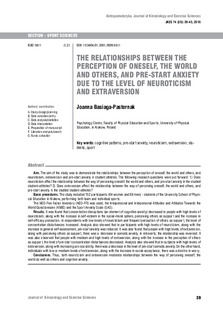The relationships between the perception of oneself, the world and others, and pre-star anxiety due to the level of neuroticism and extraversion
Abstract
Aim. The aim of the study was to demonstrate the relationships between the perception of oneself, the world and others, and
neuroticism, extraversion and pre-start anxiety in student athletes. The following research questions were put forward: 1) Does
neuroticism affect the relationship between the way of perceiving oneself, the world and others, and pre-start anxiety in the studied
student–athletes? 2) Does extroversion affect the relationship between the way of perceiving oneself, the world and others, and
pre-start anxiety in the studied student-athletes?
Basic procedures. The study included 152 participants (64 women and 88 men) - students of the University School of Physical
Education in Krakow, performing both team and individual sports.
The NEO-Five Factor Inventory (NEO-FFI) was used, the Intrapersonal and Interpersonal Attitudes and Attitudes Towards the
World Questionnaire (KNIIŚ) and the Sport Anxiety Scale (SAS).
Results. It was found that concentration disruptions (an element of cognitive anxiety) decreased in people with high levels of
neuroticism, along with the increase in self-esteem in the social-moral sphere, perceiving others as support and the increase in
self-efficacy perception. In respondents with low levels of neuroticism and frequent perception of others as support, the level of
concentration disturbances increased. Analysis also showed that in participants with high levels of neuroticism, along with the
increase in general self-assessment, pre-start anxiety was reduced. It was also found that people with high levels of extraversion,
along with perceiving others as support, there was a decrease in somatic anxiety. In introverts, the relationship was reversed. It
was also observed that people with medium and high levels of extraversion, along with the increase in the perception of others
as support, the level of pre-start concentration disturbances decreased. Analysis also showed that in subjects with high levels of
extroversion, along with increasing pro-sociability, there was a decrease in the level of pre-start somatic anxiety. On the other hand,
individuals with low or medium levels of extraversion, along with the increase in social-acceptance, there was a decline in worry.
Conclusions. Thus, both neuroticism and extraversion moderate relationships between the way of perceiving oneself, the
world as well as others and cognitive anxiety.

